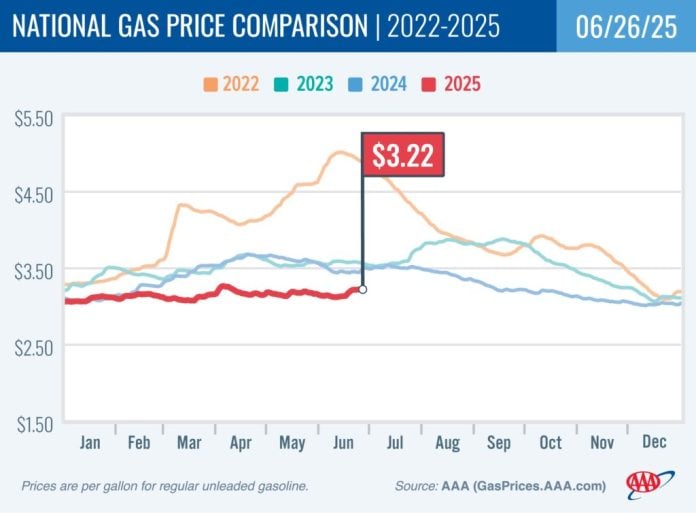As the summer travel season approaches, small business owners are keeping a close eye on fuel prices, which have seen some fluctuations recently. A spike in petroleum futures triggered by U.S. airstrikes has caused temporary concern among stakeholders, yet these prices have returned to near pre-conflict levels. According to the latest data, the national average for a gallon of regular gasoline stands at $3.22, just two cents higher than last week but significantly lower—by 27 cents—compared to the same time last year. With an estimated 61.6 million travelers on the road for Independence Day, these dynamics present both opportunities and challenges for small businesses.
Understanding the current gas price landscape is essential for small businesses that rely heavily on transportation—whether it’s in delivery, service operation, or employee commute. The increase in gasoline demand, which jumped from 9.29 million barrels per day to 9.68 million, coupled with a slight decrease in domestic gasoline supply, sets the stage for potential price hikes at the pump. For small business owners, this means planning ahead. It’s crucial to establish strategies to manage fuel costs, especially if they are tied to customer delivery or other transportation needs.
The energy market, particularly petroleum pricing, can be volatile. The recent report highlights that West Texas Intermediate (WTI) crude oil settled at $64.92 a barrel, reflecting a rebounding market following recent declines. This landscape is a reminder for businesses to monitor energy costs closely as pricing can shift rapidly based on geopolitical events as well as supply chain disruptions.
In states like California and Hawaii, where gas prices are notably higher—$4.62 and $4.47 per gallon respectively—businesses face escalated operational costs. In contrast, places like Mississippi and Oklahoma, with significantly lower prices around $2.73 to $2.81 per gallon, provide a competitive edge. Small businesses in states with higher fuel prices may need to adapt by reconsidering their delivery strategies or potentially passing on costs to consumers, which may impact sales.
For businesses contemplating electric vehicles (EVs) as part of their operational fleet, the national average per kilowatt hour at public charging stations has remained stable at 36 cents. However, charging costs can vary widely by state. For instance, electric rates in places like West Virginia and Alaska can reach 51 cents per kilowatt hour, while states like Kansas and Missouri offer rates as low as 26 to 27 cents. Navigating these differences is vital for business owners considering the transition to an electric fleet, which may offer long-term savings despite higher initial costs.
The upcoming holiday travel period enhances the importance of fuel management. With significant travel expected, creating a plan that factors in gas price fluctuations and optimizing delivery routes can safeguard profitability. Utilizing tools such as the AAA TripTik Travel planner can assist in anticipating fuel costs along travel routes, allowing businesses to budget effectively.
In addition to operational implications, small businesses need to remain flexible and responsive to price changes, keeping an open line of communication with suppliers and customers. A proactive approach can mitigate the impact of fluctuating fuel prices on operating costs. The ability to adjust pricing strategies, offer discounts, or enhance service experiences can also play a role in retaining customer loyalty during times of price instability.
As July 4th approaches and travel forecasts rise, small business owners should be prepared for both opportunities and challenges in the face of changing fuel prices. By embracing strategic planning and fostering adaptability, they can navigate this complex landscape effectively, coming out better positioned to serve their customers.
For further details and latest updates, visit the original post here.
Image Via Gas Price



